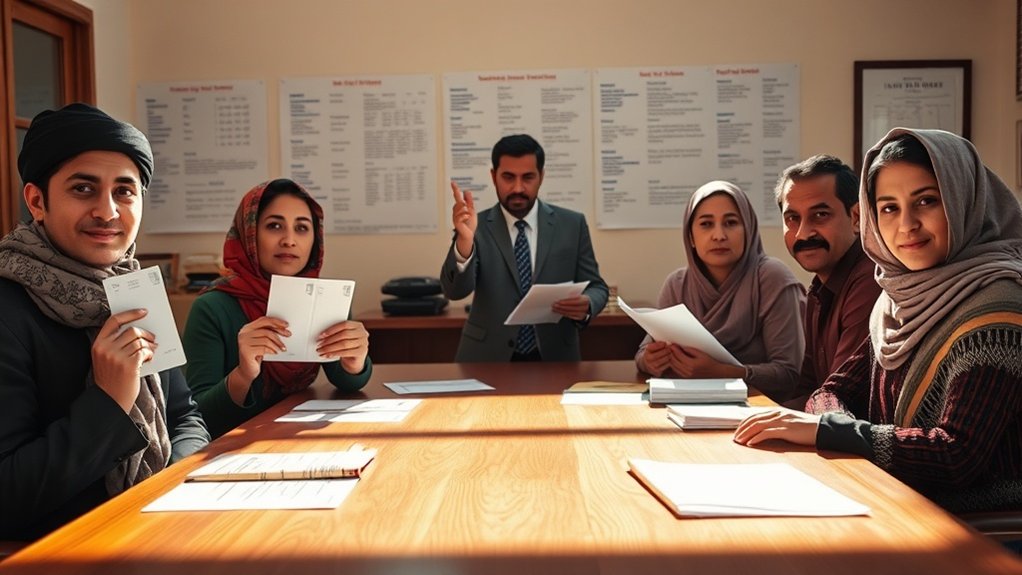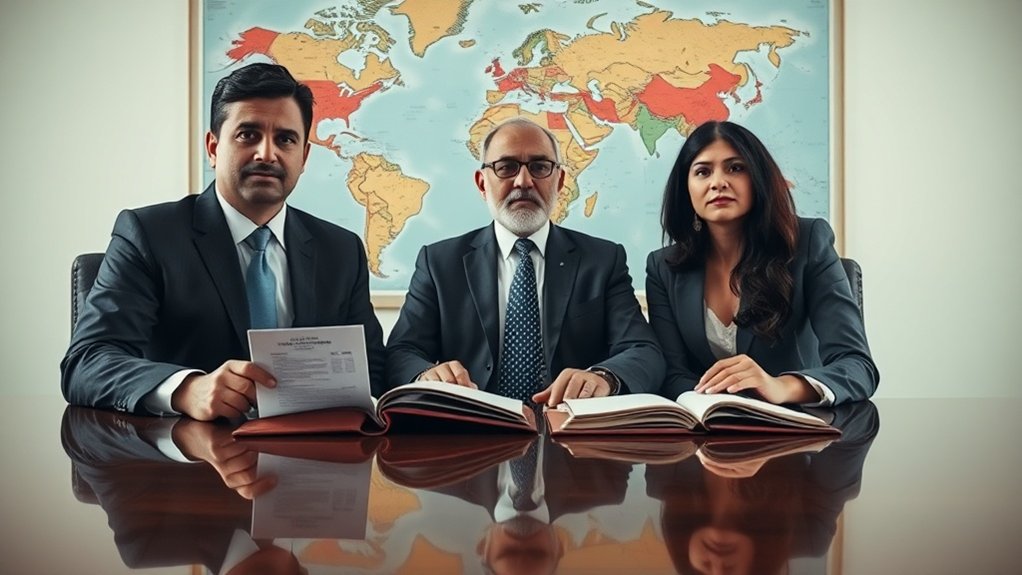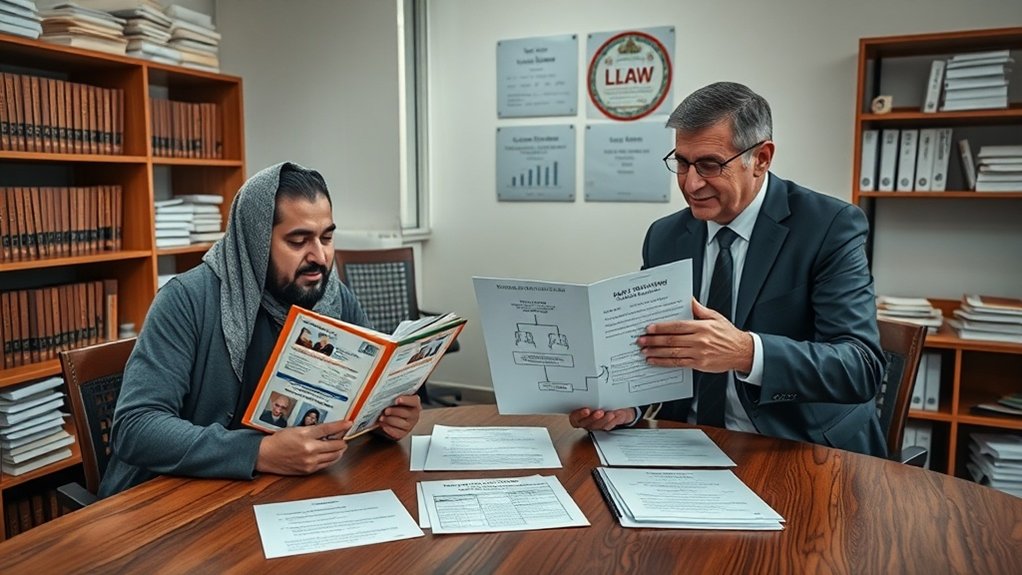If you’re an Afghan seeking safety, you’re probably weighing your options between humanitarian residence and refugee status. Each route has its own rules, timelines, and protections—and understanding the differences can shape your future. What’s the real advantage of one path over the other, and how do you know where you fit? Before you start gathering documents or seeking legal help, it’s vital to know what’s at stake and where the key distinctions begin.
Legal Definitions and Core Differences

Although both humanitarian residence and refugee status offer protection, they differ significantly in legal definitions and requirements. When you seek refugee status, you’re applying under international law, specifically the 1951 Refugee Convention. This means you must show you’re fleeing due to persecution based on race, religion, nationality, political opinion, or membership in a particular social group. Refugee status grants you broader international protection and certain rights, such as travel documents and sometimes easier integration pathways.
In contrast, humanitarian residence isn’t tied to the Refugee Convention. Instead, it’s a national solution countries offer for urgent situations that don’t meet strict refugee criteria. You might get humanitarian residence if you face generalized violence, natural disasters, or other serious harm, but not direct persecution. The benefits and duration can be more limited, and the process depends on each country’s internal laws and discretion, rather than a standardized international framework. Understanding these differences helps you choose the right path. Engaging with professional legal guidance ensures you navigate the application process correctly and increases your chances of a successful outcome.
Eligibility Criteria for Humanitarian Residence
Several key factors determine whether you’ll qualify for humanitarian residence as an Afghan applicant. You must meet specific criteria designed to address urgent needs and unique vulnerabilities. Authorities focus on your circumstances within your home country and the risks you face if returned. Unlike other residence options, humanitarian residence recognizes individual crises that may not fit the definition of refugee status but still require protection.
You’ll want to demonstrate that returning to Afghanistan would endanger your safety or dignity. This could include threats to your life, physical integrity, or civil liberties due to conflict, violence, or other human rights abuses. Your personal situation, including your family’s vulnerabilities, will also be carefully weighed.
To strengthen your application, authorities will look closely at:
- Evidence of serious threats to your safety in Afghanistan
- Documentation showing exposure to human rights abuses
- Proof of personal or family vulnerabilities
- Any immediate and compelling humanitarian needs
If you are unsure about the necessary documentation or requirements, getting professional guidance early in the process is essential to avoid errors and increase your chances of success.
Who Qualifies for Refugee Status

While humanitarian residence offers protection for those facing serious threats, refugee status follows a different set of requirements. If you’re Afghan and seeking refugee status, you’ll need to prove a well-founded fear of persecution in your home country. This persecution must be due to your race, religion, nationality, social group, or political opinions. You also can’t have safe alternatives within your country—relocating internally shouldn’t be a real option.
To make things clearer, here’s a comparison:
| Requirement | Refugee Status |
|---|---|
| Fear of Persecution | Must show a real, well-supported fear |
| Grounds for Protection | Tied to race, religion, nationality, group, or politics |
| Alternative Safe Place | No viable internal protection in Afghanistan |
For many who are uncertain about eligibility or documentation, seeking specialized legal assistance can dramatically increase the chances of presenting a successful refugee case.
Application Processes Compared
When you’re deciding between humanitarian residence and refugee status, you’ll need to look closely at what’s required for document submission and how long each process can take. Each pathway has its own set of paperwork and waiting periods. Let’s break down these differences so you know what to expect. Some applicants may also be eligible for pathways such as humanitarian programs, which can provide additional opportunities for obtaining permanent residency in the U.S. if certain requirements are met.
Document Submission Requirements
Although both humanitarian residence and refugee status offer protection pathways for Afghans, their document submission requirements differ significantly. If you’re applying for humanitarian residence, you’ll typically need to provide proof of identity, any travel documents you may have, and evidence of the circumstances motivating your request. For refugee status, expect to demonstrate a well-founded fear of persecution, often supported by detailed statements and country-of-origin information. You can’t submit one generic set of materials for both processes—each pathway demands specific supporting documents relevant to its criteria. It’s important you gather and compile the correct paperwork.
To successfully apply, you’ll generally need:
- Valid identification documents (passport, birth certificate, or national ID)
- Recent passport-sized photographs
- Written statements describing your situation and need for protection
- Any legal documents supporting your claims (court orders, police reports, etc.)
When unsure about requirements or procedures, seeking legal guidance can help avoid mistakes and improve your chances of a successful application.
Processing Timeframes Analyzed
Because the application processes for humanitarian residence and refugee status follow different procedures, their processing times can vary significantly. When you apply for humanitarian residence, you’ll usually experience a faster track, as authorities aim to address urgent protection needs. This route often prioritizes immediate safety and integration, leading to shorter waiting periods—sometimes just a few months.
On the other hand, refugee status applications often involve detailed interviews, background checks, and additional documentation. As a result, you might face considerably longer waiting times, sometimes stretching to over a year. Knowing these differences can help you plan your move, manage expectations, and organize necessary documents in advance. By understanding the contrasting timeframes, you’ll be better prepared to choose the route that best fits your situation. Seeking guidance from specialized legal support can help avoid common mistakes and expedite the application process.
Documentation and Evidence Requirements

To navigate the application process for humanitarian residence or refugee status, you’ll need to gather specific documents and evidence that support your case. Authorities rely on this information to assess your eligibility and the gravity of your situation. Don’t overlook the importance of accuracy and completeness—missing or unclear documents can delay your application or create doubts about your claims. Start by identifying the core documents requested by the local immigration office, but also consider any additional evidence that highlights your need for protection.
When preparing your file, you should focus on:
- Personal identification documents (passport, national ID, or birth certificate)
- Evidence of persecution or risk (threat letters, police reports, news articles)
- Proof of residence and entry (visa stamps, travel tickets, or boarding passes)
- Supporting statements (personal testimony, letters from community leaders, or NGOs)
Keep copies of anything you submit. Double-check all translations, and don’t hesitate to ask for legal advice if you’re uncertain. Consulting a specialized immigration lawyer can help ensure your documents are properly organized and increase your chances of a successful application.
Rights and Benefits Granted by Each Status
When you compare humanitarian residence and refugee status, you’ll notice key differences in how long you can legally stay, what services you can access, and your rights to bring family members. Each status comes with its own set of rules and limitations. Understanding these can help you decide which option best secures your future. To ensure that you choose correctly and avoid complications, many experts recommend seeking support from professionals with expertise in immigration laws who can guide you through the process.
Legal Stay Duration
While both humanitarian residence and refugee status offer Afghans a legal way to stay in a host country, the length and security of that stay can differ significantly. If you receive refugee status, you’re usually granted a more stable, long-term right to remain, sometimes with a path toward permanent residency or even citizenship. Humanitarian residence, on the other hand, is often given for short periods—sometimes only for one or two years—with renewals depending on your situation and changes in country policy. This means your future can feel less certain. Keep these differences in mind:
- Refugee status usually leads to longer, more secure residency.
- Humanitarian residence permits are often temporary and subject to renewal.
- Renewal processes for humanitarian permits can be unpredictable.
- Refugee status can open doors to permanent solutions.
- Some countries use electronic immigration systems to streamline application and renewal processes, which can impact how quickly humanitarian or refugee claims are processed.
Access to Services
Beyond the length of your stay, the status you receive also shapes what support and opportunities you’ll actually have day to day. If you gain refugee status, you’ll typically access a broader range of services, including public healthcare, education, social welfare, and often language courses—all on par with local residents. Some integration support and job placement programs target refugees specifically, helping you settle and find work more quickly. With humanitarian residence, you’ll still get basic healthcare and schooling, but you might face more restrictions or delays when applying for social benefits. Certain programs, especially those for specialized assistance or vocational training, might not be available. Always confirm local policies, as some municipalities offer broader access regardless of status, but generally, refugees enjoy stronger and more immediate support. Since both statuses depend on Brazilian immigration laws, the guidance of a specialized immigration lawyer can help you fully understand your rights and ensure you don’t miss out on services you may be entitled to.
Family Reunification Rights
To summarize, here’s what you need to keep in mind:
- Refugee status usually offers faster reunification.
- Humanitarian residence may have extra conditions.
- The definition of “family” may differ for each status.
- Legal advice is strongly recommended.
Common Challenges Faced by Afghan Applicants
Because the application process for both humanitarian residence and refugee status involves complex requirements, Afghan applicants often face significant obstacles. You may encounter language barriers that make it tough to understand official documents or communicate your case. The documentation requirements can be overwhelming, especially if you had to flee quickly and couldn’t bring important papers.
Waiting periods are another challenge. You might wait months or even years for a decision, all while coping with uncertainty and stress. Many applicants worry about proving their identity and their story to authorities. It’s common to feel lost navigating unfamiliar bureaucracy. The table below highlights some of these key challenges you’re likely to face:
| Challenge | Impact on Applicants |
|---|---|
| Language Barriers | Difficulty understanding procedures |
| Lack of Documentation | Delays in processing and approval |
| Long Waiting Periods | Anxiety and uncertainty |
Recognizing these challenges helps you prepare and approach the process with realistic expectations.
The Role of Legal Assistance in the Process

When you’re navigating the complex process of applying for humanitarian residence or refugee status, having legal assistance can make a significant difference. It’s easy to feel overwhelmed by the paperwork, deadlines, and requirements. A skilled legal professional helps you understand your rights and prepares your documents accurately, increasing your chances of a favorable outcome. They can interpret confusing legal language, identify possible obstacles, and ensure nothing important is missed.
Legal support also empowers you to present a strong and convincing case by:
- Clarifying definitions and differences between humanitarian residence and refugee status
- Helping you gather and organize the necessary supporting evidence
- Advising you on how to answer questions from authorities and during interviews
- Informing you about your legal rights and local regulations
With legal assistance, you’re better prepared to manage the challenges that arise and can confidently pursue the option that best fits your circumstances.
Key Steps for Afghans Seeking Protection Abroad
A clear path can make all the difference as you seek protection beyond Afghanistan’s borders. Start by gathering your identity documents, personal statements, and any evidence of danger or persecution. Find trustworthy legal support—lawyers or organizations that understand humanitarian and refugee processes. Then, review the eligibility criteria for both refugee status and humanitarian residence in your destination country. Submit your application as early as possible, and prepare for interviews or hearings that allow you to share your story honestly.
The journey can feel overwhelming and isolating. Here’s a glimpse of what many experience:
| Step | Feeling | Hope |
|---|---|---|
| Leaving Home | Fear & Uncertainty | Safety is possible beyond the unknown |
| Legal Support | Relief | You don’t have to face this alone |
| Application | Anxiety | Each form brings you closer to safety |
| Waiting | Restlessness | Patience can lead to a new beginning |
| Decision | Anticipation | A chance to rebuild your life |
Frequently Asked Questions
What is the status of Afghan refugees?
Afghan refugees may hold formal refugee status, humanitarian protection, or temporary visas depending on the host country, granting varying rights to work, study, and access services.
Is the Brazil humanitarian visa open for Afghans?
Yes, Brazil continues offering humanitarian visas for Afghans, allowing entry, residence, and work under special migration programs.
Is humanitarian protection the same as refugee status?
No, humanitarian protection is temporary and offers safety without full refugee rights, while refugee status is recognized under international law with longer-term protections.
Is humanitarian parole still available for Afghans?
Yes, the U.S. and some other countries maintain humanitarian parole programs for Afghans at risk, providing temporary entry for urgent protection needs.
Can Family Members Join Applicants After Obtaining Status?
Yes, once you obtain status, your family members can usually join you through a process called family reunification. You need to apply for your eligible relatives, such as a spouse, children, or sometimes parents, depending on the specific laws. Authorities will review your application and confirm your relationship. Make sure you provide accurate documents and follow the procedures, so your loved ones can join you as quickly and smoothly as possible.
How Long Does Each Process Usually Take?
Processing times can vary a lot, but typically, you’ll find that applying for humanitarian residence can take several months, sometimes up to a year. Refugee status applications might take a similar amount of time, though they can stretch longer depending on the case’s complexity and caseload. You should be prepared for delays, and it’s vital to submit all required documents as soon as possible to help speed things up. Patience really helps.
Is It Possible to Change Status Later?
Yes, you can usually change your status later, but you’ll need to follow specific procedures depending on your current situation and the new status you’re seeking. Authorities typically require you to apply for the new status and provide documentation proving you meet the requirements. Be ready for a new evaluation, and remember, changing status might impact your rights or benefits, so it’s wise to get legal advice before starting the process.
Are Interviews Required for Both Application Types?
Yes, you’ll go through interviews for both application types, but the process can vary. For humanitarian residence, authorities might request an interview to clarify your situation, but it’s not always mandatory. Refugee status almost always involves a formal interview to assess your fear of persecution and gather detailed information. In both cases, be ready to provide supporting documents and answer questions honestly about your background, reasons, and specific circumstances.
What Happens if an Application Is Denied?
If your application is denied, you’ll receive a detailed decision explaining the reasons for the rejection. You typically have the right to appeal, so don’t lose hope—you can challenge the decision within a specific period set by the authorities. It’s important to act quickly and gather additional evidence or legal support if necessary. Failing to appeal or submit a new application may result in losing your right to stay in the country.
Conclusion
If you’re an Afghan seeking protection, understanding the difference between humanitarian residence and refugee status is essential for choosing the right path. Humanitarian residence can offer a quicker solution if you have urgent needs, while refugee status is for those facing clear persecution. Legal help is vital to navigate requirements and boost your chances. Don’t try to go it alone—get expert support to protect your rights and ensure the best possible outcome for your future.


